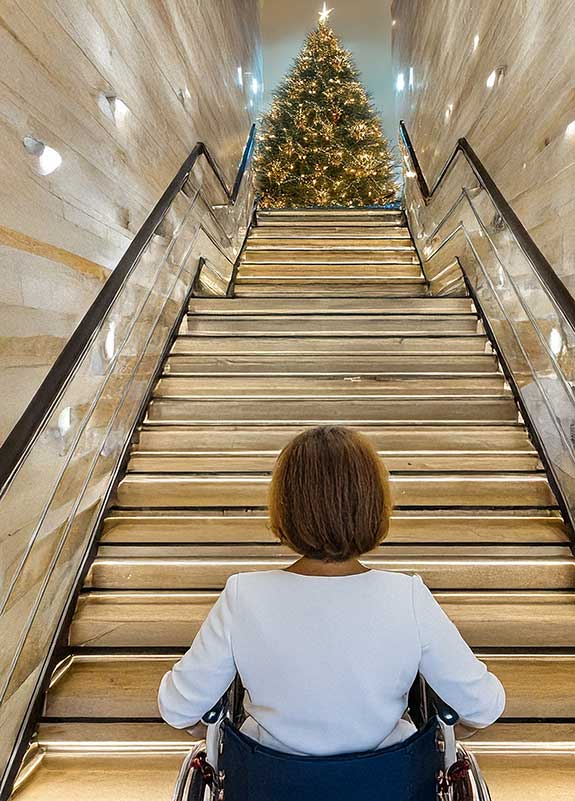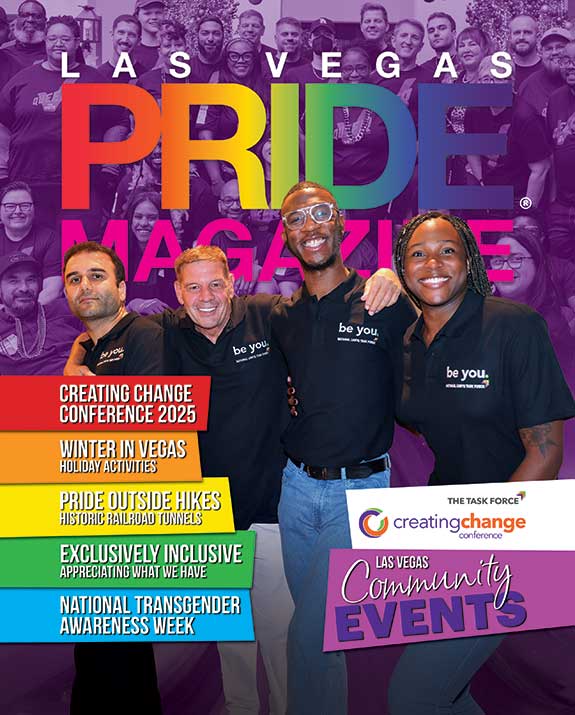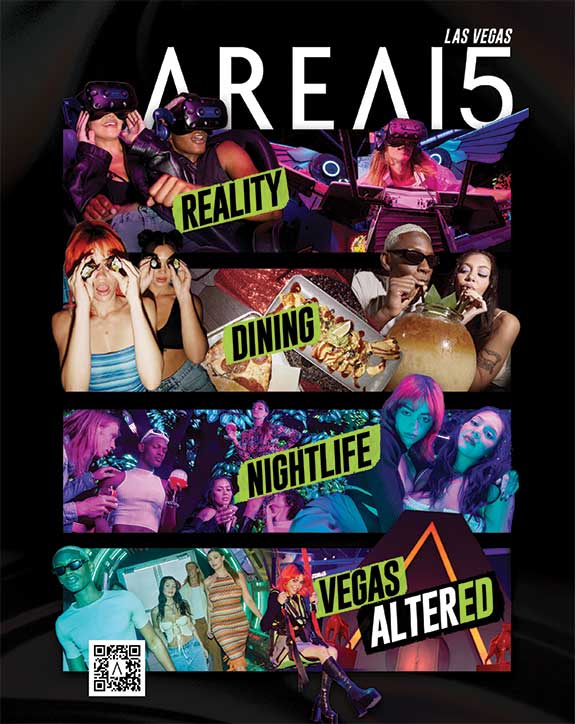Exclusively Inclusive.
By Karen Brain
November 30th is the 16th anniversary of my accident. It made me see how fortunate I am and appreciate the wonderful gifts I DO have in my life more than ever before. To explain the significance of this accident, I need to tell you what happened earlier that year that impacted the accident.
One day, at the start of summer, I discovered both of my artificial hips were broken. Fake joints don’t last forever; eventually, they must be redone. (That would have been nice to know when I first got those fake hips.) I wasn’t able to fix my broken hips immediately. I had to wait for pre-approval if I wanted my health insurance to cover it. The first hip was fixed eight weeks later, and the second was twelve weeks after the first. Of those twenty weeks, I worked for eighteen full-time in the office. I did so for multiple reasons. I feared taking too much time off work, losing my job and healthcare, and adding workload for my coworkers. I was hoarding my time off to take care of my health needs, as many people with disabilities do. I was afraid to ask for help because I didn’t want to be a burden (internalized Ableism).

Just before the second hip was fixed, my manager pleaded with me to take six weeks off following the surgery to fully recover before returning to work. I agreed to do so. Monday after Thanksgiving was my return date, December 1st.
I was fortunate and grateful to stay with my parents after each procedure. They both were retired by then and lived in San Diego near me, which allowed me to rest (and work) as much as possible. They did the shopping, cooking, laundry, and transportation, and Mom helped me shower and dress every day. If double broken hips had to happen, I was glad they were there and able to assist.
My plan for November 30th was to prepare for work. I slept in one last time. My roommate left for the day, so I had the place to myself. I walked to the kitchen in my underwear and T-shirt to make coffee. It was risky but glorious.
I went to my room to shower (I occupied the primary bedroom and bathroom). My bedroom windows were open, just a few feet from the main street, with blinds closed. My bedroom door was closed, but my bathroom door remained open. I shut the water off when I finished showering. In a moment when I wasn’t moving at all, my newest hip collapsed, and I fell to the shower floor, hitting my head on the faucet on my way down.
I lay there, my head hurt, unable to reach anything or move my body to get out. I realized my hip was dislocated; it felt like the ball shot through the socket and was somehow up at my rib cage. Even if I could get up, I would not be able to stand on that leg.
Luckily, I had seen the Life Alert TV commercial from the 1980s a million times. I started screaming, “Help, I’ve fallen, and I can’t get up! Please call 9-1-1!” I figured my chances were good that someone outside might hear me since it was Sunday morning and my windows were open. I screamed for what felt like forever.
It seemed strange that I felt very sleepy even though I was shivering cold. I decided to start singing (of course I did), and every minute or two, I’d try yelling for help again. Then I thought, “Is this how I die? After everything I’ve experienced, THIS is how I die?!” I started to cry. Who would find me? When would they find me? How would they find me – NAKED?!
I’m not sure when I started falling asleep, but the next thing I remember, I heard a voice clearly say, “Wake up and scream!” Immediately, I opened my eyes and screamed as loud as I could, “HELP!” A few seconds later, my roommate knocked on my bedroom door. They had just stopped by for a minute to grab something and heard me scream. After they called 9-1-1, I asked them to bring me my cell so I could call Mom.
To my surprise, when the paramedics arrived, I started speaking in a third-person medical-case manner: “We’ve got a physically disabled female here, diagnosed with juvenile rheumatoid arthritis, on lots of prescription meds, has a permanent port-a-cath in her upper right chest, multiple artificial joints, most recently two new hips this year, and likely now a broken one from this fall, hit her head on the way down, but no other known injuries.” Followed by, “Hi, my name is Karen.”
I was screaming for help for over an hour before my roommate came home and found me. My pelvis was broken in multiple places. I had to have surgery again, this time to fix the broken bones and somehow stabilize a new artificial hip in there.
I felt lucky. I didn’t die. The physical damages weren’t worse. I heard the message to wake up and scream, wherever it came from. My roommate came home and found me. I had healthcare and insurance. My parents were nearby. I finished showering before the fall.
A week later, I had the surgery. It lasted for hours, almost all day. I remember waking up in the surgery room and hearing, “Oh! She’s waking up! She’s waking up!” People were cheering and clapping.
The next thing I remember, someone was pushing my bed down the hallway to my hospital room, with my mom walking alongside, holding onto the bedrail and looking at me. It looked like she was trying not to cry, which was strange because Mom usually doesn’t cry. So I asked her, “What is it, Mom?” She told me I almost died in surgery, and they weren’t sure if I’d ever be able to walk again.
I knew I would walk again without any doubt (and without any supporting information). I said casually, “Oh, don’t worry, I’ll walk again.” The doctor said if I had any chance of walking, I would have to be on bed rest for at least a couple of months to ensure all the pieces of bone appropriately healed before I tried walking. If I didn’t, I certainly would not walk again.
I moved back to my parents’ home, this time in a rented hospital bed. Memorable moments during that bed rest period included watching Obama’s inauguration on TV, and the Christmas fight with Grandma Brain. With my disability experiences and Grandma Brain’s experiences, I should have seen that Christmas fight coming.
My parents and I thought that instead of doing traditional Christmas at Grandma’s that year, the family would come to my parent’s home for a potluck dinner to make things easier for my parents and inclusive for me. Grandma’s home was not accessible for me when I was in my best physical condition, with steep steps at every entrance, narrow doorways, and tight spaces. I always needed assistance. Following the hip surgeries, even if I didn’t have broken bones to mend, I could not spend Christmas at Grandma’s. We had enough space for everyone, so the obvious choice would be for the family to go to my parent’s home for just this once.
Absolutely not. Grandma was fully aware of the circumstances but insisted on traditional Christmas at her home. Furthermore, both of my parents were expected to attend, which meant leaving me home alone for several hours. My dad said, “fine” to Grandma; Mom said, “Absolutely not,” and I was speechless. Additionally disappointing was that the rest of the family didn’t support or advocate for a different Christmas. I chose to believe there was a lack of communication and awareness to explain their behavior. Otherwise, it’s too painful to accept. Sometimes, focusing the blame and negative feelings on one person (like mean Grandma Brain) rather than many is easier.

Meanwhile, I had to take additional time off work since my employer didn’t offer remote work at the time. Any aspect of work triggered anxiety and sadness for me. I cried often, for hours, thinking about the additional workload I probably put on my coworkers and management by being away. I worried about the impact it would have on our relationships. I wanted to start working again as soon as possible.
I was also grateful for the Family and Medical Leave Act (FMLA) and my employer’s Catastrophic Leave program. These allowed me to maintain my employment, income, and healthcare benefits. One addition I would love to see in our program is the ability for donation recipients to thank donors. There are ways to do this while maintaining the donors’ anonymity, and it would be very meaningful for the recipients.
Once I was able to stand on my legs, I had to learn to walk again. My bones and muscles were different, and I had to retrain them. Walking wasn’t the only function changed by the accident. Several of my activities of daily living (ADLs) were impacted. Luckily, I didn’t have to remain on medical leave during the long rehab phase. Once I was able to drive, go to the bathroom independently, and move around with what I named my Cadillac (forearm walker I’ve used as needed since age twelve), I returned to work. However, if full-time remote work had been an option, then I could have returned to work several weeks earlier, which would have benefited my employer, coworkers, and me.
Recovering from that accident took about a year. I realize my great fortune and privilege to be able to walk again. Since then, I constantly strive to prevent any fall risks. Over time, I’ve remodeled parts of my home to increase accessibility and reduce fall or injury risks. I always look down around me as I walk and move (I noticed this most looking at our wedding pictures and videos). I also gained a new fear: showers. How do I know it won’t happen again? How can I prevent something if I don’t know what caused it in the first place? A wall-mounted shower seat and grab bars were installed in my shower.
I believe the successful recovery, ability to maintain my lifestyle, and future risk prevention have been due to the wonderful people and resources available in my life. Nowadays, features like full-time remote work, flexible schedules, virtual meetings (including a virtual option for in-person meetings), and other technological advancements make the workplace much more accessible. Plus, our homes are usually more accessible than business locations, decreasing the need for accommodations and employers’ costs for facilities and utilities. Features like these benefit employees (both disabled and non-disabled) and employers.
I don’t think my injuries that year were unique for someone living with a disability. On the contrary, I think falling in the shower could happen to anybody. I’ve found a few keys to living with a disability: creativity and thinking outside the box, focusing on the positives and humor, surrounding myself with wonderful people, and teamwork. There’s an old proverb about elephants and ants. It says something like elephants may be more powerful than ants, but considering their size, ants are stronger. There are also children’s books about elephants and ants, with messages like never underestimate anyone, demonstrating the benefits of asking for help and teamwork. Considering this, I’ve learned people with disabilities are like ants. Though we may seem incapable and weak, on the contrary, considering what we must endure regularly, I would argue that we are stronger.
May you be surrounded by wonderful people, have the strength to endure, and have a lifetime filled with laughs and positive experiences! Happy holidays!

This article was originally published in the 2024 Winter Issue of Las Vegas PRIDE Magazine, and can be read in its original format here.


